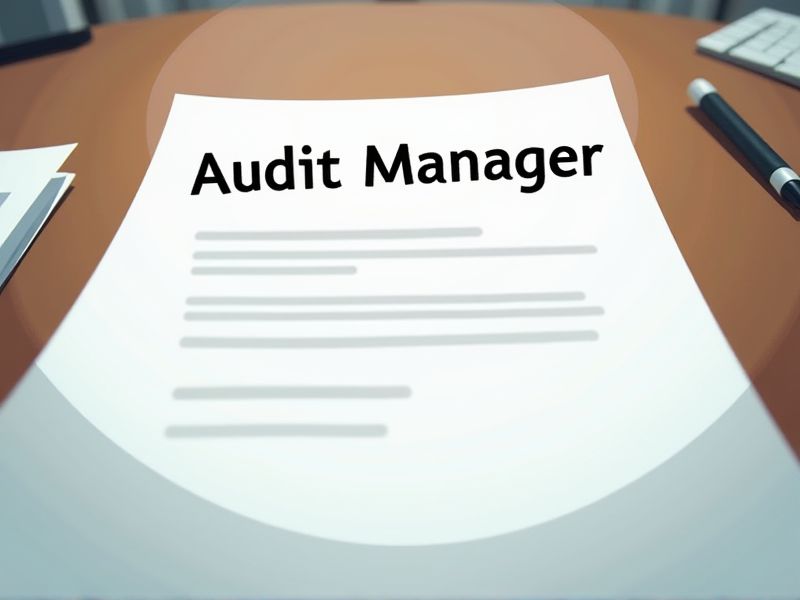
An Audit Manager oversees financial accuracy, compliance, and risk assessment within an organization, which demands a robust understanding of regulatory frameworks and auditing standards. Certifications like CPA or CIA validate the manager's competence in executing audits and ensure adherence to accounting principles. Possessing these credentials not only enhances credibility but also aligns with industry demands for transparency and accountability. Key certifications crucial for an Audit Manager's role include CPA, CIA, and possibly CISA.
Certified Internal Auditor (CIA)
Certified Internal Auditor (CIA) provides comprehensive knowledge in evaluating risk management, which directly enhances the decision-making capabilities of an Audit Manager. Possessing a CIA ensures adherence to international auditing standards, thereby increasing the credibility and reliability of an audit manager's work. The CIA credential equips audit managers with advanced skills in internal controls and governance processes, boosting organizational efficiency. Certification in CIA distinguishes an audit manager in the field, making them more competitive and desirable in the job market.
Certified Information Systems Auditor (CISA)
The Certified Information Systems Auditor (CISA) certification provides essential validation of an Audit Manager's expertise in information systems auditing, control, and security. Holding a CISA enhances credibility, which can lead to increased trust from stakeholders and clients. An Audit Manager with a CISA is often more competent in identifying potential risks and implementing effective controls. Studies and industry surveys often highlight that CISA-certified professionals tend to earn higher salaries compared to their non-certified counterparts, indicating the certification's perceived value and demand.
Certified Public Accountant (CPA)
Audit Managers rely on Certified Public Accountants (CPAs) due to their expertise in financial regulations and standards, which ensures the integrity of audits. CPAs provide a deep understanding of tax laws, accounting principles, and financial reporting, enhancing the audit process's accuracy. With a CPA's advanced analytical skills, Audit Managers can identify financial discrepancies and implement corrective measures effectively. The rigorous CPA qualification process instills trust and credibility in audit reports, which is crucial for regulatory compliance and investor confidence.
Certified Fraud Examiner (CFE)
Audit Managers oversee the accuracy and compliance of financial processes, but CFEs bring specialized skills to identify and investigate fraud risks. CFEs possess expertise in detecting warning signs and employing effective fraud prevention strategies. This specialized knowledge enhances the audit team's ability to mitigate financial misstatements and fraudulent activities. Integrating CFEs into the audit process strengthens the organization's internal controls and boosts stakeholder confidence.
Certified Risk Management Assurance (CRMA)
Certified Risk Management Assurance (CRMA) equips an Audit Manager with advanced risk management skills, crucial for identifying and evaluating organizational risks. The certification enhances the manager's ability to ensure organizational governance, thereby increasing the efficiency and effectiveness of auditing processes. As financial and operational risks continue to rise, CRMA provides the necessary framework to navigate these challenges and implement robust audit strategies. With this certification, Audit Managers can better align risk management and assurance efforts with organizational objectives, fostering trust among stakeholders.
Certified Government Auditing Professional (CGAP)
Audit Managers often face complex regulatory environments; the CGAP certification signifies expertise in government auditing standards, ensuring compliance. Enhanced credibility with a CGAP can lead to increased trust from stakeholders, which can facilitate smoother audit processes. Mastery of risk management and control techniques associated with the CGAP allows Audit Managers to optimize operational efficiency. As the demand for transparency in government operations grows, CGAP credentials become crucial for maintaining auditing effectiveness.
Certified in Risk and Information Systems Control (CRISC)
Achieving a CRISC certification equips an Audit Manager with an enhanced ability to identify and evaluate IT risk, which is crucial for maintaining strong governance and compliance. Mastery in risk identification allows the Audit Manager to develop robust control frameworks that mitigate potential impacts on the organization's objectives. The certification enhances the manager's credibility and communication with stakeholders, ensuring that risk considerations are integrated into decision-making processes. Organizations benefit by reduced IT-related disruptions and improved alignment between risk management and business goals.
ISO 27001 Lead Auditor
An ISO 27001 Lead Auditor provides essential expertise in understanding and implementing the requirements of the ISO 27001 standard. This expertise ensures that an organization's information security management systems (ISMS) align with international best practices. By having a Lead Auditor on the team, an Audit Manager ensures audits are thorough and identify potential security vulnerabilities. Their certification validates their capability to guide and enhance the organization's compliance efforts.
Project Management Professional (PMP)
A Project Management Professional (PMP) certification enhances an audit manager's ability to effectively plan and execute complex audit projects, ensuring they meet deadlines and adhere to budget constraints. It provides structured methodologies and tools essential for managing resources and risks, which are critical in the dynamic environment of auditing. The knowledge gained from PMP fosters improved communication and collaboration skills, supporting audit teams in achieving organizational goals. It elevates the credibility and leadership capability of an audit manager, which is crucial for influencing stakeholders and driving positive change within the organization.
Six Sigma Green Belt
A Six Sigma Green Belt equips an Audit Manager with robust analytical skills, improving process efficiency and reducing errors in audits. Understanding Six Sigma principles allows them to identify and eliminate waste, streamlining audit workflows. This expertise fosters data-driven decision-making, enhancing audit quality and client satisfaction. An Audit Manager with a Green Belt can lead initiatives that align audit processes with organizational goals, driving value and continuous improvement.
Summary
By gaining certifications, you enhance your credibility in audit processes and methodologies. This increased trust can lead to more leadership opportunities within your organization. Consequently, your team may experience improved efficiency and compliance due to your advanced knowledge. Ultimately, your certified expertise contributes to superior audit outcomes, boosting overall organizational success.
